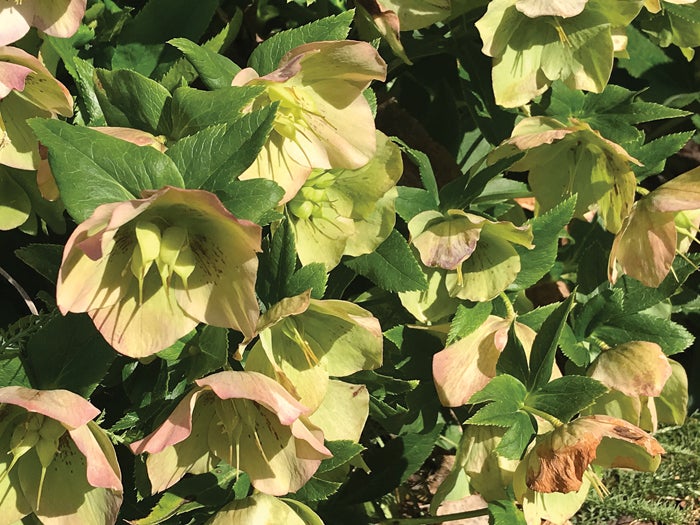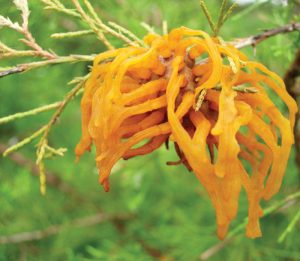Plant sale is this weekend; more on orange stuff
Published 12:00 am Friday, May 4, 2018

- Submitted photo Hellbore will be one of the plants at the Master Gardeners' Plant Sale this weekend.
By Amy-Lynn Albertson
Rowan County Extension Director
Q: When is the Master Gardener Plant Sale and what kind of plants will be for sale?
A: The Rowan County Master Gardener Plant Sale is Saturday, May 5, 8:30 a.m.-noon, at the Rowan County Agriculture Center, 2727 Old Concord Road in Salisbury.
There will be an abundance of perennial pollinator plants like purple coneflower, beebalm, Stoke’s Aster, passionflower vine and more. For the shade, they’ll have hellebore, hosta, the beautiful celandine poppy and lots of ferns.
There will be shrubs for sale like hydrangeas, spirea, yew and butterfly bush. If you are looking for some unique edible plants, elderberry and pomegranate are available, too.
The Master Gardeners will be available at the sale to answer your planting and gardening questions to help you get the most out of your plants.
In addition to fabulous plants, the Master Gardener Volunteers will have some of their beautiful can art for sale. There will also be a raffle for a beautiful ceramic tile and cement planter, a rain barrel and metal art flower sculpture by Amy Hart. Tickets are $5 each or $10 for three. The drawing will be at the end of the plant sale at noon.
Q: Orange globby aliens have attacked my cedar tree. What can I do?
A: The orange slimy globs that showed up last week after the rain on cedar trees is the fruiting body of the cedar apple rust fungus or Gymnosprorangium juniper-virginianae. Cedar apple rust alternates between two hosts to complete its life cycle.
The big orange glob on the cedar in April to early May produces tiny spores that are carried by the wind to the alternate host — an apple or hawthorn tree. The glob or gall will quickly dry up on the cedar and hang there for a few years. Cedar apple rust doesn’t bother the cedar tree but can defoliate an apple, crabapple or hawthorn where it lands and completes its lifecycle in the summer.
On apples, the fungus causes bright orange spots on the leaves and can disfigure the fruit. Since this pathogen requires both hosts to complete its life cycle, control can be achieved by eliminating one host from the surrounding area, although eradication is not feasible or desirable. Additional control measures include the use of disease-resistant apple cultivars, properly timed fungicide applications on apple trees, and removal of cedar galls before spring rains.

Submitted photo Cedar apple rust appears as an orange mass on cedar trees, which it does not affect. It can damage apple trees nearby.
Q: I have holes in my yard and all these bees flying around. Help!
A: Not all bees live in hives, nearly 70 percent of the 20,000 species of bees live in the ground. Most of the ground-nesting bees become active in the early spring. One of the most prolific are the bees belonging to the family Andrenidae. All the species in this family are solitary and nest in the ground.
Solitary means they do not maintain hives with hundreds of workers like honeybees or yellow jackets. A single female bee builds the nest by burrowing into the ground. The bee provides each brood cell with a mixture of pollen and nectar called bee bread that serves as food for young larvae. After laying an egg, she closes the brood cell and starts another.
After completing several brood cells, the mother will seal the entrance and leave the nest to begin a new nest. After a few weeks, she will die, leaving the next generation safe in the ground. In spring, bees complete development and emerge as adults that dig their way out of the ground and forage for pollen and nectar to provide for their nests.
We usually see the male bees swarming over nests trying to mate with newly emerged females. The other noticeable aspect of these bees is the small mounds of dirt excavated for each nest. Although these bees are solitary, they like to nest near each other. I like to think of it as a housing development for bees. These bees prefer to nest in dry, sparsely vegetating areas.
Therefore, if you have bees nesting in your lawn, it is because the grass is thin and soil dry. The bees don’t make it this way, they take advantage of the conditions. If anything, the bees are providing a valuable service by aerating the lawn. Irrigation over the three to four weeks bees are active will encourage them to find other nest sites and reduce their abundance the following year. Also, they like thin lawns with plenty of bare spots.
Native bees are an essential part of ecosystems and food production. We should take steps to protect these bees or at least use non-lethal means to encourage them to nest somewhere else.
For more information about bees or other horticultural topics contact the Rowan County Extension Center at 704-216-8970, or on the web at rowan.ces.ncsu.edu.




